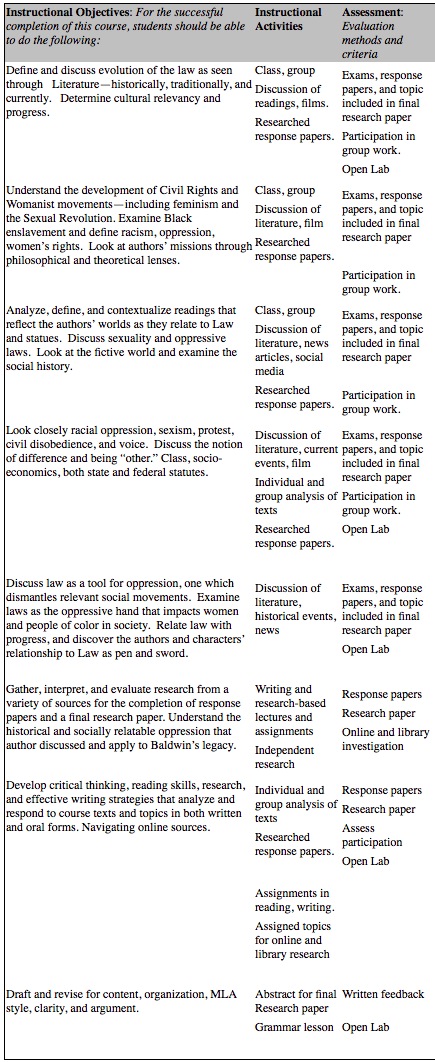ENG3401: Law through Literature
Dr. Williams
NAMM 503
Office Hours: Wed 4-6pm
Reflections on Justice: the heavy hand of inequality
If we are to keep our democracy, there must be one commandment: thou shalt not ration justice.
Judge Learned Hand
Required Texts: 1.Lee, To Kill a Mockingbird 2. Turow, Limitations 3.Ferrell and Williams, Looking for the Enemy: The Eternal Internal Gender Wars of Our Sisters
Recommended Text: Ferrell and Williams: Good Writing Made Simple: 3rd edition, 978-14652-6783-2 (Gold and black pen on cover)
Design:
This course will allow us to thoroughly examine literature and films that focus on the often unbalanced scales of justice—especially as they relate to women and various ethnic groups. Together, we are going to examine the jury, the trial, the legal process, and the effects of judgment—or lack thereof. We will look at historically impacting cases, the development or dismantling of established laws, as well as the current status of these socially relevant issues. Using philosophy, specifically pragmatic precepts, we will also place the intentions of laws alongside their actual results, and see who benefits from the oppressive hand of injustice and, more importantly, who fails.
This course is both reading and writing intensive. As such, to make sure we are processing the classroom discussions, we will have several exams on the essays, novels, and films we scrutinize together. Each of us will be responsible for multiple short essay papers and student briefs that will require online and/or library research, and there will also be a major style manual research paper (MLA or Chicago) assigned that will require each of us to review and outline lessons learned throughout the entire semester; as such, constant note taking is not only strongly encouraged but required.
Keep in mind that this class requires the ability to engage in mature conversations, as we will talk openly about racism, religion, family, sexism, sex, Class, culture, poverty, and politics.
Requirements:
- All assignments must be typed, double spaced, black ink, 12 point font. Do not attempt to submit handwritten work.
- All assignments must be submitted on time. Nothing will be accepted late. Nothing will be accepted via email after class.
- Every student is allowed one absence. Every unofficial absence after that will result in the reduction of a complete letter grade.
- Respect must be given to everyone in the class.
- No cooked food is allowed in classroom. Ever.
- No cellular devices are allowed “on” in any shape, form, or fashion during class.
- No tape recording of class meetings is allowed.
- No Headphones are allowed.
- No laptops are allowed.
- Digital readers are allowed.
Grading:
- Participation: 10% Discussion, in-class reading, insight, peer response.
RESEARCH Paper: 25% - Paper will be formatted and explained in-depth by the professor. It will be 8-12pages, double spaced, MLA style. Works Cited page is separate. The paper will require a minimum of six outside sources.
- Tests: 45%Primarily based on our discussions about the films and readings, as well as both primary sources and assigned supplemental materials (see assignments).
- Assignments: 20% Response Papers will focus on the researched information that will include history, social relevance, variations, status, and how the assigned topic speaks to the film and reading. Additionally, there is an abstract that must be submitted and approved before Research paper submission.
Failure to attend class will simply result in failure. See above requirement.
NOTE: ENTERING THE ROOM 20MINUTES AFTER ATTENDANCE HAS BEEN TAKEN WITHOUT AN OFFICIAL EXCUSE WILL NOT COUNT FOR ATTENDANCE.
Plagiarism:
The college has a strict policy regarding plagiarism. If you are caught cheating, in any way, you will fail this class and be required to meet with the Division Dean.
Plagiarism is intentionally and knowingly presenting the ideas or works of another as one’s own original idea or works in any academic exercise without proper acknowledgment of the source. The purchase and submission of a dissertation, thesis, term paper, essay, report, or other written assignment to fulfill the requirements of this course is plagiarism and violates section 213-b of the State Education Law. Any student caught plagiarizing will fail this course, be presented to the Division Dean for expulsion, and will be prosecuted to the fullest extent of the law.
Students and all others who work with information, ideas, texts, images, music, inventions, and other intellectual property owe their audience and sources accuracy and honesty in using, crediting, and citing sources. As a community of intellectual and professional workers, the College recognizes its responsibility for providing instruction in information literacy and academic integrity, offering models of good practice, and responding vigilantly and appropriately to infractions of academic integrity. Accordingly, academic dishonesty is prohibited in The City University of New York and at New York City College of Technology and is punishable by penalties, including failing grades, suspension, and expulsion. The complete text of the College policy on Academic Integrity may be found in the catalog.
Objectives, Activities, Assessment




